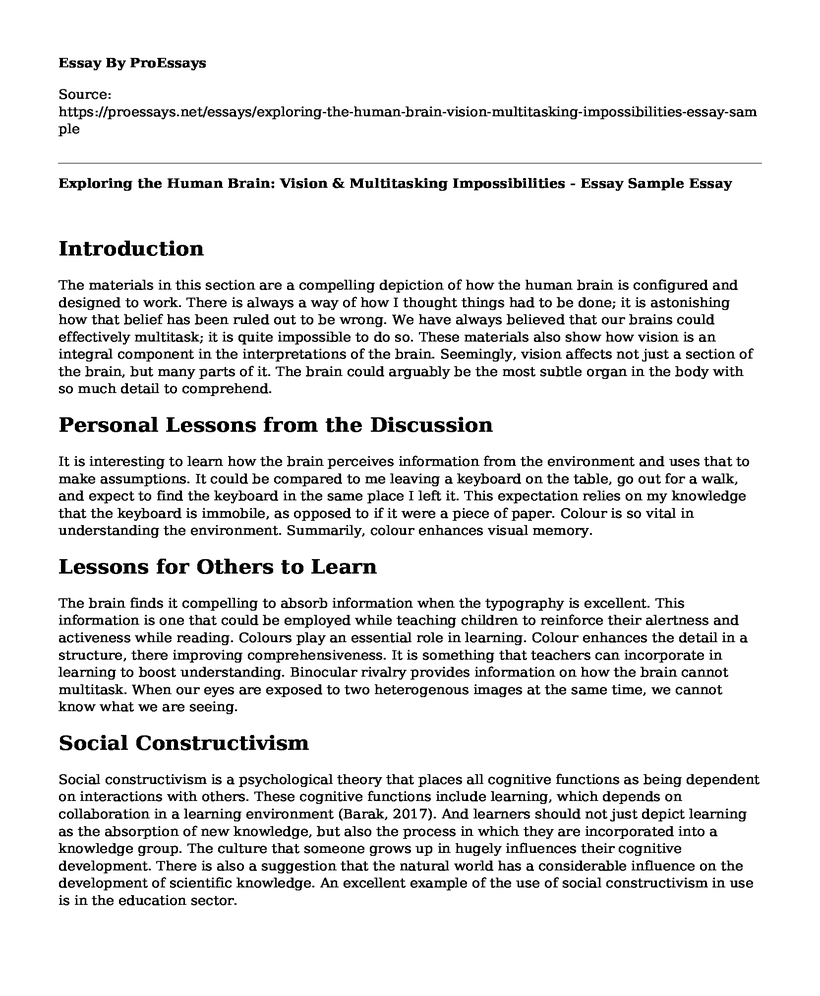Introduction
The materials in this section are a compelling depiction of how the human brain is configured and designed to work. There is always a way of how I thought things had to be done; it is astonishing how that belief has been ruled out to be wrong. We have always believed that our brains could effectively multitask; it is quite impossible to do so. These materials also show how vision is an integral component in the interpretations of the brain. Seemingly, vision affects not just a section of the brain, but many parts of it. The brain could arguably be the most subtle organ in the body with so much detail to comprehend.
Personal Lessons from the Discussion
It is interesting to learn how the brain perceives information from the environment and uses that to make assumptions. It could be compared to me leaving a keyboard on the table, go out for a walk, and expect to find the keyboard in the same place I left it. This expectation relies on my knowledge that the keyboard is immobile, as opposed to if it were a piece of paper. Colour is so vital in understanding the environment. Summarily, colour enhances visual memory.
Lessons for Others to Learn
The brain finds it compelling to absorb information when the typography is excellent. This information is one that could be employed while teaching children to reinforce their alertness and activeness while reading. Colours play an essential role in learning. Colour enhances the detail in a structure, there improving comprehensiveness. It is something that teachers can incorporate in learning to boost understanding. Binocular rivalry provides information on how the brain cannot multitask. When our eyes are exposed to two heterogenous images at the same time, we cannot know what we are seeing.
Social Constructivism
Social constructivism is a psychological theory that places all cognitive functions as being dependent on interactions with others. These cognitive functions include learning, which depends on collaboration in a learning environment (Barak, 2017). And learners should not just depict learning as the absorption of new knowledge, but also the process in which they are incorporated into a knowledge group. The culture that someone grows up in hugely influences their cognitive development. There is also a suggestion that the natural world has a considerable influence on the development of scientific knowledge. An excellent example of the use of social constructivism in use is in the education sector.
Social Constructivism in Education
Social constructivism forms the bases of all discussions that emphasize the increase of student discussion in classrooms. Group discussions enable students to share the knowledge they have learned in the classroom, which also improves their communication abilities. Many students believe that these discussions provide them with a platform to test and synthesize their ideas. Additionally, the group discussions motivate students as they get a good grasp of classroom content. The students also develop collaborative skills and the ability to argue and express their opinions without arousing contempt effectively (Bozkurt, 2017). There is also a feeling of community that provides students with a platform to communicate with each other freely.
From my own experiences, I have noted how social constructivism can boost research in open-ended investigations. The learners can collaboratively identify real-life problems and work to find viable solutions. Eventually, the learners will explore and formulate contrasting or supporting solutions. The different solutions will then provide the learners with a chance to deliberate and find common ground. Through this deliberation process, learning is bolstered. My experience was in participating in journal writing with my classmates. We deliberated on possible ideas and thoughts before finding a mutual understanding of how we would proceed.
References
Barak, M. (2017). Science teacher education in the twenty-first century: A pedagogical framework for technology-integrated social constructivism. Research in Science Education, 47(2), 283-303.
Bozkurt, G. (2017). Social Constructivism: Does It Succeed in Reconciling Individual Cognition with Social Teaching and Learning Practices in Mathematics?. Journal of Education and Practice, 8(3), 210-218.
PSY110 Module 4. (n.d.). Retrieved from https://sway.office.com/pHRr703MbVeI3pAx?ref=Link
Cite this page
Exploring the Human Brain: Vision & Multitasking Impossibilities - Essay Sample. (2023, Aug 01). Retrieved from https://proessays.net/essays/exploring-the-human-brain-vision-multitasking-impossibilities-essay-sample
If you are the original author of this essay and no longer wish to have it published on the ProEssays website, please click below to request its removal:
- Interactive Teaching Using the Technology-Oriented Framework
- Article Analysis Essay on What's Wrong with Black English
- Response Essay: English as a Second Language (ESL)
- The Acquisition of Prepositional Phrases Among Arab Learners of EFL
- Essay Example on Conflict Resolution in Schools: Challenges for Teachers
- Is College Worth the Cost? - Research Paper
- Summary of Strengths - Essay Example







